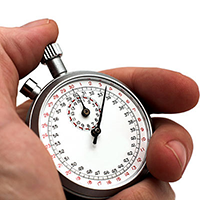- Offensive Techniques & Strategies

Getting More Things Done in Less Time

Coaching can be a very time (24/7) consuming endeavor. There will never be enough hours in the day. Therefore, making the most of the time that you have is vital. In almost all cases, the real problem is not a lack of time, but actually a poor usage of time. In addition to a well thoughtout program master, time management and efficiency is a key ingredient to any success. With proper time management you can get more things done, in less time, and with less stress.
Here is an excerpt form Vicki Dennis's Successful Business article 'Where do all the hours go?' which gives seven excellent ways to save and use your time wisely:
IDENTIFY THE TIME WASTERS.
To save time you must first determine where you are losing it. Establish a record by recording, in detail, everything you do hourly for one to two weeks. Once completed analyze the log and eliminate the obvious time wasters and trivial.PLAN YOUR DAY.
The best way to avoid wasting future time is to make a daily "to do" list. Be specific about tasks. Include one hour block of uncommitted and no distractions time. Create the "to do" list late in the afternoon the day before, and then get things done the next morning before you can be distracted.SET PRIORITIES.
Prioritize your "to do" list (1., 2., 3., etc). Concentrate on the most important first.LEARN TO DELEGATE.
Rely on assistance. Give challenging as well as busy work to your assistants. However, in delegating you must be willing to teach others to perform the tasks. Delegating will take time at first; however, in the long run it is the best time saver.DECREASE INTERRUPTIONS.
Have calls and visitors screened. Avoid clutter, clear desk every evening. Start early (7:30 am). This is the most productive time of the day. Maintain a quite hour during the day. No calls, no visitors except for emergencies.SIMPLIFY PAPER WORK.
Stack according to priority. Informal, reply on a copy of the original letter or email. If possible, try to handle each piece of paper once. Filing, "What would happen if thrown away?"CONQUER PROCRASTINATION.
Set deadlines. Do the worst and quickest 'to do' tasks first.
© 2026 HoopTactics All Rights Reserved.
